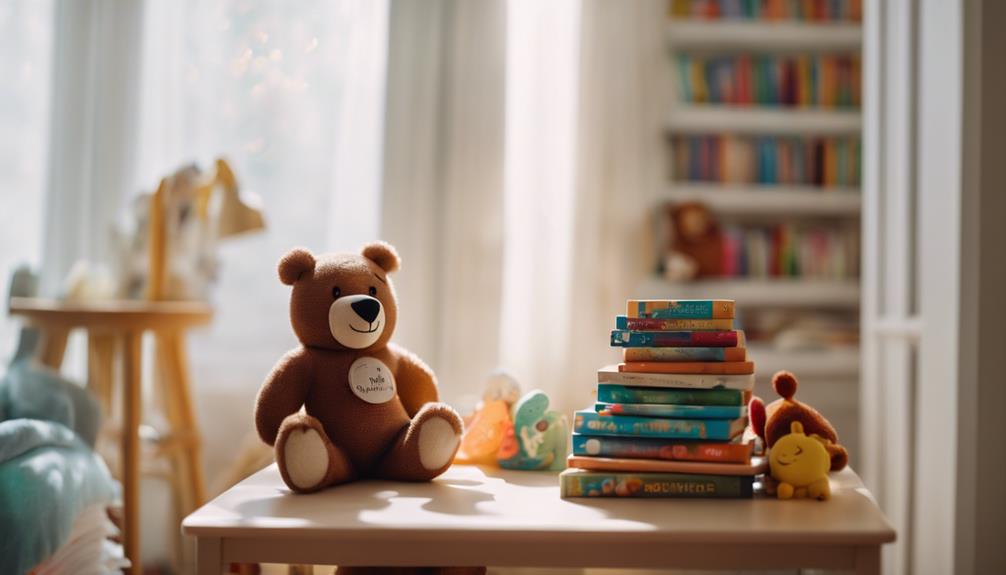Enhance your baby’s language abilities by emphasizing gestures, incorporating real words, and reading daily. Plan social playdates for interaction, positively acknowledge speech attempts, and expand vocabulary through two-word combinations related to your child’s interests. Use pitch changes to teach inflections for emotional impact. By following these crucial tips, your baby’s language development will thrive.
Key Takeaways
- Encourage real words, not baby talk, for vocabulary expansion and clarity.
- Acknowledge and praise baby's speech attempts to boost confidence.
- Utilize gestures to strengthen communication skills and connect words with actions.
- Foster language development through daily reading routines and interactive story sessions.
- Plan social playdates to enhance social skills, vocabulary development, and communication abilities.
Nonverbal Communication Through Gestures
How do babies communicate nonverbally through gestures before they start speaking?
Nonverbal communication plays an essential role in early language development. Babies often use gestures like pointing, waving, and reaching out to express their needs and desires. By responding to these gestures, you can help strengthen their communication skills. Encouraging hand movements and acknowledging their nonverbal cues can aid babies in connecting words with actions.
Gestures serve as a bridge between what babies want to convey and their yet-to-develop verbal language. These gestures help babies express themselves effectively before they can articulate their thoughts through words.
Paying attention to your baby's gestures and responding appropriately not only supports their early language development but also fosters a strong foundation for effective communication skills in the future.
Real Words Over Baby Talk

Encourage using authentic language instead of baby talk to enhance your child's vocabulary expansion. Research indicates that using real words is crucial for toddlers' language development. By using proper terms instead of baby talk, you can help your child learn language more effectively. Babies benefit significantly from hearing correct words for objects and actions, supporting their vocabulary growth and enhancing their language skills.
| Real Words | Baby Talk | Language Development |
|---|---|---|
| Enhance vocabulary | Limit language growth | Support language development |
| Aid in learning | Impede communication skills | Improve vocabulary expansion |
| Provide clarity | Cause confusion | Enhance language skills |
| Encourage understanding | Hinder comprehension | Support effective communication |
Reading Throughout the Day
Reading throughout the day is a wonderful way to introduce your baby to a world of words and ideas.
By engaging in interactive story sessions, you can enhance their vocabulary and comprehension skills.
Making reading a daily routine can have long-lasting benefits for your child's literacy and language development.
Daily Reading Routine
Throughout the day, engaging with books and discussing their contents can greatly benefit your baby's language development. Establishing a daily reading routine, beyond just bedtime stories, is important for enhancing your baby's language skills.
When reading, take the time to discuss the pictures in the books with your little one. This not only engages them but also promotes cognitive development by encouraging observation and critical thinking.
Asking questions about the emotions or sounds related to the book's content is another effective way to foster language development in babies. By encouraging them to express their thoughts and feelings about the story, you're helping them build a stronger foundation for communication skills.
Starting a reading habit early with your baby not only provides immediate benefits but also sets the stage for long-term literacy advantages and improved reading abilities in the future. Remember, reading from infancy onwards can have a significant impact on your child's literacy and language skills in the years to come.
Interactive Story Sessions
Engaging in interactive story sessions throughout the day with your baby fosters continuous language development and active participation. During these sessions, discussing pictures and asking questions not only enhances your baby's comprehension but also boosts their language skills. Incorporating interactive story sessions into daily routines, such as before naptime or during playtime, creates valuable bonding moments while stimulating cognitive development.
Regular reading throughout the day helps babies engage with stories and language consistently, encouraging active participation and learning during various daily routines. By making interactive story sessions a part of your daily routine, you lay a strong foundation for lifelong literacy skills. Starting reading early and maintaining this practice throughout the day not only promotes bonding but also nurtures your baby's cognitive abilities.
Planning Social Playdates

When planning social playdates for your baby, consider the benefits they bring, such as enhancing social skills and language development. Building relationships with peers of the same age can provide valuable opportunities for communication and listening practice.
Here are some tips to help you organize successful playdates and support your baby's language growth.
Playdate Benefits Explained
To maximize the benefits of playdates for your baby's language development, consider planning social gatherings with peers. Playdates play an important role in fostering social interaction and vocabulary development in babies and toddlers. By being around children of the same age, your little one is encouraged to enhance their language growth and communication skills.
Peer interaction during playdates provides valuable opportunities for listening, interacting, and practicing essential social skills. In group settings, such as those found in playdates, children can support each other's language development and engage in vocabulary practice together. These social playdates promote language growth through meaningful interaction and engagement with peers.
Encouraging your baby to participate in playdates with other children can greatly contribute to their overall language development and help them build a strong foundation for effective communication skills in the future.
Social Skills Building
Consider arranging social playdates to enhance your baby's social skills and vocabulary development. Social playdates provide a valuable opportunity for peer interaction, allowing babies to practice communication skills in a group setting.
Being around peers of the same age encourages babies to engage in conversations, listen actively, and interact with others, all of which contribute to language growth. In these settings, babies have the chance to learn from each other, fostering the development of social skills and expanding their vocabulary.
Playdate Planning Tips
Enhancing your baby's social skills and vocabulary development can be effectively achieved through well-planned social playdates with peers. Planning social playdates can provide valuable opportunities for your little one to engage in peer interaction, fostering language growth and social skills in a fun and interactive setting.
Here are some tips to help you organize successful playdates:
- Invite a small group of children: Keep playdates intimate to allow for meaningful interactions.
- Prepare age-appropriate activities: Tailor games and toys to suit the developmental stage of the children attending.
- Encourage turn-taking and sharing: Promote positive social behaviors during playtime.
- Provide a comfortable and safe environment: Guarantee the play area is child-friendly and conducive to group play.
Piggybacking on Two-Word Combos

Start building on your toddler's language skills by encouraging them to combine two-word phrases as they progress in their development. Babies typically begin using two-word combinations around 18 months of age, signaling an important milestone in their language development.
To support this growth, prompt your child to add one or two words to their existing vocabulary when communicating. Help them link actions with objects to create meaningful phrases that enhance their communication skills. Guide them in stringing words together, such as 'more milk' or 'big ball,' to facilitate their ability to express thoughts and needs effectively.
Positive Feedback on Speech Attempts

Acknowledge and praise your baby's speech attempts to boost their confidence and motivation. When providing positive feedback on your baby's speech attempts, you're creating a supportive environment that fosters their language development.
Here are some tips to help you effectively encourage your baby's communication efforts:
- Respond to the content of your baby's message rather than focusing on pronunciation errors.
- Encourage communication without constantly correcting mistakes to create a positive learning environment.
- Validate your baby's communication efforts to show them that their attempts are valued and heard.
- Positive feedback on speech attempts helps babies feel supported and encourages further language development.
Following Child's Interests for Vocabulary Expansion

By exploring your child's interests, you can greatly expand their vocabulary. Engaging in interest-based conversations with your child is a powerful way to enhance language development.
When you follow your child's lead and discuss topics that captivate their attention, you create a stimulating environment for vocabulary expansion. Tailoring conversations to match your child's interests not only makes learning new words more engaging but also helps them connect these words to real-life experiences.
Introducing vocabulary related to your child's favorite activities or objects can make language learning more relatable and meaningful for them. By delving into subjects that pique their curiosity, you provide opportunities for deeper understanding of new words and concepts.
Teaching Inflections With Pitch Changes

To enhance your child's language development, consider incorporating pitch changes when teaching inflections. Teaching strategies that involve pitch changes can have a substantial impact on your baby's understanding of emotions and intentions in speech.
Here are some tips to help you effectively teach inflections using pitch changes:
- Use high pitch for questions and excitement to grab your baby's attention.
- Utilize low pitch for calm or serious statements to help your baby recognize different tones.
Changing pitch can aid in developing your baby's emotional intelligence by conveying various emotions effectively. Varying pitch in speech can keep your baby engaged and interested, promoting strong language skills.
Frequently Asked Questions
What Are 4 Ways You Can Help Your Baby's Language Skills Develop?
To help your baby's language skills grow, talk to them daily, describe objects with adjectives, sing and dance for soothing and learning, and respond to their babbling. Engage and communicate with your little one often.
What Is Most Effective for Helping a Baby Learn Language?
Like a gentle breeze shaping a young tree, consistent engagement through conversations, descriptive talk, reading, and encouraging mimicry from birth is most effective for helping your baby learn language, setting a strong foundation for lifelong communication skills.
What Can Parents Do to Encourage an Infant's Language Development?
To encourage an infant's language development, engage in back-and-forth interactions, use descriptive words, and read daily. Talk often; babies learn more from talkative parents. Incorporate gestures for nonverbal communication, linking words with actions for effective learning.
How to Improve Baby Speaking Skills?
To improve baby speaking skills, engage in daily conversations, use descriptive words, read regularly, encourage gestures, and respond positively to their communication attempts. These actions support language development and build your baby's confidence.
Conclusion
To sum up, remember that every interaction with your baby is an opportunity to enhance their language development. By incorporating gestures, real words, reading, social playdates, two-word combos, positive feedback, vocabulary expansion, and pitch changes, you're laying the foundation for strong communication skills.
Like a puzzle coming together, each piece of language development forms a beautiful picture of your child's growing abilities. Keep nurturing their language skills, and watch them blossom into confident communicators.









